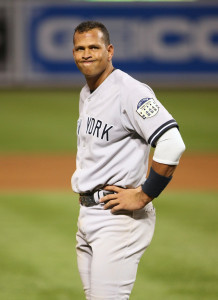
MLB’s luxury tax not working
By Josh Martin, Sports Editor
Alex Rodriguez, otherwise known as “A-Rod,” of the New York Yankees will make more money this year than the entire team of the Houston Astros combined. His $29-million-a-year salary ranks as the highest paid player in the MLB for the past several years, while the highest paid player on the Astros, Bud Norris, weighs in at $3 million annually. What is wrong with this picture?
Without an enforced hard salary cap in the MLB and just a mere luxury tax that taxes teams that exceed the total salary amount allowed, players like A-Rod sign ridiculous contracts with rich teams like the Yankees, who tend to dominate the league over smaller teams. This season, 10 players on the Yankees will make $10 million or more, including three players in the $20-million-plus club. This huge chunk of change is no problem for the Yankees, who no doubt will have to pay a luxury tax this season.
The first time a team exceeds the luxury tax they have to pay the league 22.5 per cent of the amount they are over, the second time teams must pay 30 per cent, and for every time after that is 40 per cent. The Yankees have paid a luxury tax for 10 consecutive years, totalling at $222.5 million and accounting for 95 per cent of the total fines.
The Yankees are so rich that they can afford these star-studded players as well as this luxury tax—which was originally introduced to discourage teams from having a substantially higher payroll than the rest of the league. The Yankees’ payroll—projected at $228 million—is nearly 10 times that of the Astros, who have shrunk their payroll down to around $25 million.
Is this luxury tax really working?
The NHL and the NFL are both constructed around the hard salary cap system, where the league sets a maximum amount of money allowed for player salaries and no team can exceed that amount. The NBA uses a soft salary cap system, which is identical to the hard salary cap but with a few exceptions that allow teams to exceed the cap limit when keeping players that are already on the team.
Looking at the NHL specifically, the hard salary cap makes it fair for all 30 teams to compete without rich teams dominating the league. If the NHL was under the luxury tax system teams, like the Toronto Maple Leafs, New York Rangers, and Montreal Canadiens—who are the three richest teams in the league according to Forbes—would be the major destinations for all of the bigger-named players. These teams would be able to afford eight, nine, or even 10 superstars that all demand $8 million a year whereas the poorest team in the league, the St. Louis Blues—who finished second overall in the Western Conference last year—would be left in the dust.
If you look at teams in the NHL, each one that makes the playoffs has a legitimate chance at winning the Stanley Cup, whether they’re rich or not. Take a look at the LA Kings last year, who just squeezed into the post-season grabbing the eighth and final playoff spot in the Western Conference.
This doesn’t happen in the MLB. The teams that are most successful are the teams that are the wealthiest—with the exception to the Oakland Athletics, who changed history finishing first in the ALW despite only having $41-million in salary.
The top four teams that have made the most appearances in the World Series are as follows: the Yankees (40), the San Francisco Giants (19), the St. Louis Cardinals (18), and the LA Dodgers (18). And it just so happens that according to Forbes, the Yankees and Dodgers are the top two wealthiest teams, while the Giants and Cardinals come in at seven and 10.
If the MLB wants to have fairer competition amongst teams, then it’s about time they get rid of this petty luxury tax. Introducing a hard salary cap would change the game immensely, and bring in a stronger fan base across North America. The smaller teams would have a stronger chance in having success against these monstrous corporations.
If a single player is making more than an entire team combined, then something has got to change.

